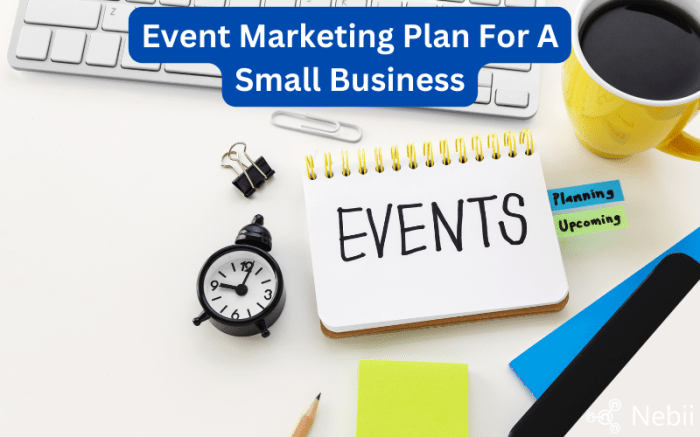Event Marketing for Small Businesses sets the stage for innovative strategies to connect with your target market and elevate your brand presence. Dive into the world of events tailored for small businesses and unlock the potential for growth and success.
Introduction to Event Marketing for Small Businesses
Event marketing is a vital strategy for small businesses to connect with their target audience in a meaningful way. By hosting or participating in events, businesses can create a personal and interactive experience that helps build relationships and brand loyalty.
The Importance of Event Marketing
Event marketing allows small businesses to showcase their products or services in a more engaging and memorable manner compared to traditional advertising methods. This direct interaction with potential customers can lead to higher conversion rates and long-term customer loyalty.
Benefits of Event Marketing for Small Businesses
- Increased brand awareness: Events provide an opportunity for businesses to increase their visibility and reach a larger audience.
- Lead generation: By collecting contact information from event attendees, businesses can generate valuable leads for future marketing efforts.
- Networking opportunities: Events allow small businesses to connect with industry influencers, potential partners, and customers in a face-to-face setting.
- Customer engagement: Through interactive activities and demonstrations at events, businesses can engage with customers on a deeper level and create memorable experiences.
Types of Events for Small Business Marketing: Event Marketing For Small Businesses

When it comes to marketing for small businesses, hosting events can be a powerful tool to engage with customers and promote products or services. Here are some types of events that are suitable for small business marketing:
In-Person Events
- Pop-Up Shops: Setting up a temporary retail space to showcase products and interact with customers.
- Product Launch Parties: Introducing a new product to customers and generating buzz around it.
- Networking Events: Hosting gatherings to connect with other businesses and potential clients.
Virtual Events
- Webinars: Hosting online seminars to educate customers about your industry or products.
- Virtual Workshops: Conducting interactive sessions to teach skills or showcase your expertise.
- Online Sales: Offering exclusive deals or discounts through virtual events to drive sales.
Now, let’s compare the advantages and disadvantages of hosting in-person events versus virtual events for small businesses:
Advantages of In-Person Events
- Face-to-Face Interaction: Build personal connections with customers and create memorable experiences.
- Tangible Experience: Customers can physically see and touch products, leading to potential sales.
- Networking Opportunities: Meet potential partners, collaborators, or customers in a more organic setting.
Disadvantages of In-Person Events
- Higher Costs: Renting venues, planning logistics, and other expenses can add up quickly.
- Limited Reach: In-person events may only attract local customers and limit the potential audience.
- Time-Consuming: Organizing and executing in-person events require more time and resources.
Advantages of Virtual Events, Event Marketing for Small Businesses
- Cost-Effective: Virtual events are typically more budget-friendly compared to in-person events.
- Wider Reach: Reach a global audience without geographical limitations, expanding your customer base.
- Data Analytics: Easily track attendee engagement, gather insights, and measure ROI.
Disadvantages of Virtual Events
- Lack of Personal Connection: It can be challenging to build relationships without face-to-face interaction.
- Technical Issues: Connectivity problems or software glitches may disrupt the event experience.
- Competing for Attention: Virtual events face stiff competition for attendees’ time and focus.
Lastly, here are some examples of successful event marketing campaigns for small businesses:
1. A local bakery hosting a cupcake decorating workshop that resulted in increased foot traffic and social media engagement.
2. An online clothing boutique organizing a virtual fashion show that boosted online sales and brand awareness.
3. A small consulting firm hosting a webinar series that positioned them as industry experts and generated leads.
Planning and Organizing Events for Small Businesses
Planning and organizing events for small businesses is crucial for successful event marketing campaigns. It involves several key steps to ensure that the event runs smoothly and achieves its objectives.
Setting Clear Objectives and Goals
- Define the purpose of the event: Whether it’s to increase brand awareness, generate leads, or foster customer relationships.
- Set specific and measurable goals: Determine what you want to achieve through the event, such as the number of attendees, sales generated, or social media engagement.
- Establish key performance indicators (KPIs): Identify metrics that will help you track the success of the event, such as ROI, customer satisfaction, or brand perception.
Importance of Budgeting and Resource Allocation
- Allocate resources effectively: Determine the budget for the event and allocate funds to different aspects, such as venue rental, catering, marketing, and staffing.
- Consider the return on investment (ROI): Evaluate the potential ROI of the event and ensure that expenses align with the expected outcomes.
- Monitor and control costs: Keep track of expenses throughout the planning process and make adjustments as needed to stay within budget.
Promoting Events Effectively
Social media has become a powerful tool for promoting events, especially for small businesses. With the ability to reach a large audience quickly, businesses can use platforms like Facebook, Instagram, and Twitter to create buzz around their events. By posting engaging content, utilizing event-specific hashtags, and partnering with influencers, businesses can effectively promote their events and generate interest from potential attendees.
Social Media Promotion Strategies
- Utilize visually appealing graphics and videos to capture the attention of users scrolling through their feeds.
- Run targeted ads to reach specific demographics and increase event visibility among relevant audiences.
- Create event pages or groups to provide detailed information, updates, and a platform for attendees to interact and share with others.
Role of Email Marketing
Email marketing remains a valuable tool for promoting events to a targeted audience. By sending personalized invitations, event reminders, and exclusive offers to subscribers, businesses can drive attendance and build relationships with their customers. Utilizing email automation tools and segmenting email lists based on interests and behaviors can enhance the effectiveness of event promotions through email campaigns.
Importance of Compelling Event Content
Creating engaging and compelling event content is essential to attract attendees and generate excitement. By highlighting unique selling points, sharing testimonials from past attendees, and offering sneak peeks or behind-the-scenes looks, businesses can build anticipation and encourage sign-ups. Additionally, incorporating interactive elements, such as contests, polls, or interactive Q&A sessions, can make the event more interactive and memorable for attendees.
Measuring Success and ROI in Event Marketing

When it comes to event marketing for small businesses, measuring success and return on investment (ROI) is crucial to determine the effectiveness of your efforts. By identifying key performance indicators (KPIs), tracking ROI, and analyzing data, small businesses can make informed decisions for future events.
Key Performance Indicators (KPIs)
- Number of attendees: Measure the turnout at your event to gauge interest and reach.
- Leads generated: Track the number of potential customers or contacts acquired during the event.
- Social media engagement: Monitor likes, shares, and comments on social platforms to assess online presence.
- Sales conversions: Calculate the number of sales directly attributed to the event.
Tracking and Analyzing ROI
- Calculate costs: Determine event expenses and compare them to revenue generated to calculate ROI.
- Use unique codes or links: Assign specific codes or links for event promotions to track sales directly tied to the event.
- Survey participants: Gather feedback from attendees to evaluate satisfaction and potential ROI indicators.
- Utilize analytics tools: Implement tools like Google Analytics to track website traffic and conversions post-event.
Evaluating Event Effectiveness
- Review feedback: Analyze attendee feedback and surveys to identify strengths and areas for improvement.
- Compare KPIs: Compare KPIs against initial goals to assess performance and success of the event.
- Adjust strategies: Use data-driven insights to make informed decisions for future events and marketing campaigns.